Agoraphobia belongs to the group of anxiety disorders. The main characteristic of agoraphobia is the overwhelming fear of situations or places from which there seems to be no escape.
One of the best ways to overcome this anxiety disorder is by talking to a licensed therapist.
In this article, we’ll review the six best platforms to connect you with an agoraphobia therapist. We’ll also explain the best type of therapy for this anxiety disorder.
Want to skip right to the suggestions for agoraphobia therapists? Here are our 6 recommended therapy solutions:
Agoraphobia therapist near me
Let’s begin our reviews. In this section, we’ve looked at the six best online therapy services that offer agoraphobia treatment.
| Povider | Good For | Location | Pricing |
|---|---|---|---|
| BetterHelp | Quick match with the right therapist four you | Online therapy | $65 to $90 per week (billed every 4 weeks) |
| Teen Counseling | Teens from ages 13-19 | Online therapy | $65 to $90 per week (billed every 4 weeks) |
| Online-therapy.com | Finding licensed and experienced therapists with a Cognitive Behavioral Therapy (CBT) approach | Online therapy | $40/week to $88/week (including our 20% discount first month) |
| Find-a-therapist.com | Finding and contacting the right therapist for you | Online and in-person therapy | Varies depending on the counselor fee |
| Calmerry | Depression therapy, online grief counseling, anxiety therapy, therapy for OCD, self-esteem therapy | Online therapy | $49.50 to $73.75 per week (billed monthly) |
| TalkSpace | Depression, anxiety, bipolar disorder, OCD, PTSD, LGBTQIA+ therapy | Online therapy | Varies according to insurance coverage or self-pay options |
1. BetterHelp
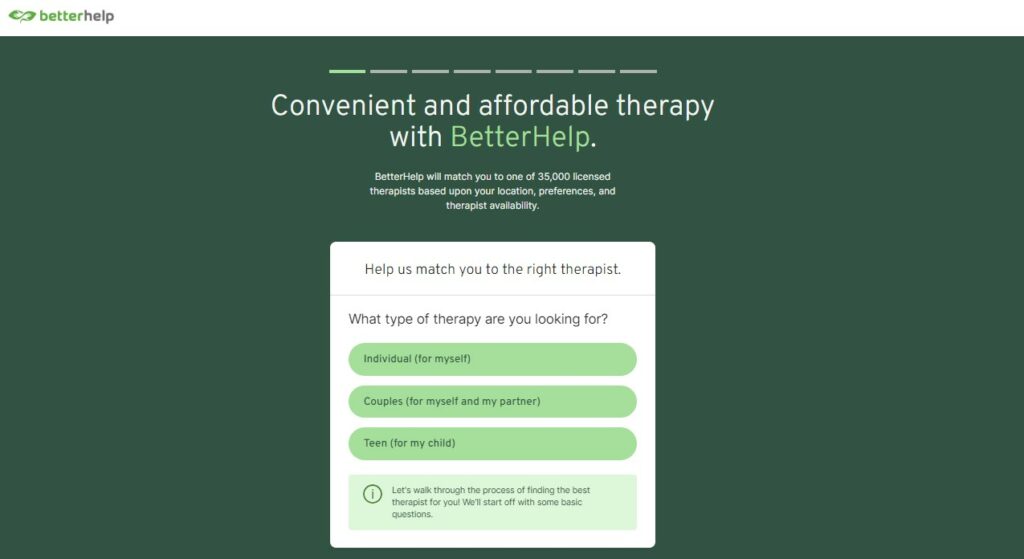
Explore emotional well-being with BetterHelp – your partner in affordable online therapy. With 30,000+ licensed therapists and plans starting from only $65 per week, BetterHelp makes self-care accessible to all. Complete the questionnaire to match with the right therapist.
- Good for: Quick match with the right therapist four you.
- Location: Online therapy.
- Pricing: $65 to $90 per week (billed every 4 weeks).
- Features: iOS and Android app available, message your therapist anytime, live sessions are scheduled weekly and done via live chat, phone, or video call.
BetterHelp is an online therapy platform that offers help for a range of different issues, including agoraphobia and panic attacks. As anxiety is one of the predominant mental health issues that people currently experience, BetterHelp has a variety of clinical therapists specializing in this area.
Read our BetterHelp review here.
2. Teen Counseling

Nurture your teenager’s well-being through Teen Counseling. Tailored for ages 13-19, their online therapy begins at $65/week. This includes a weekly live session, the flexibility to message your therapist at any time, and the opportunity for parents to connect with therapists. Empower your teen’s journey today with Teen Counseling – start with their online questionnaire.
Note: We collaborate with top-tier mental health companies and receive advertising fees from purchases through the Teen Counseling links.
- Good for: Teens from ages 13-19.
- Location: Online therapy.
- Pricing: $65 to $90 per week (billed every 4 weeks).
- Features: The platform is designed to make finding a therapist easy, message your therapist anytime, live sessions are scheduled weekly and done via live chat, phone,
Teen Counseling is offers online therapy por teenagers from ages 13 to 19. All therapists there are licensed, accredited professionals, each of whom offers different types of therapy including agoraphobia and anxiety therapy.
3. Online-therapy.com
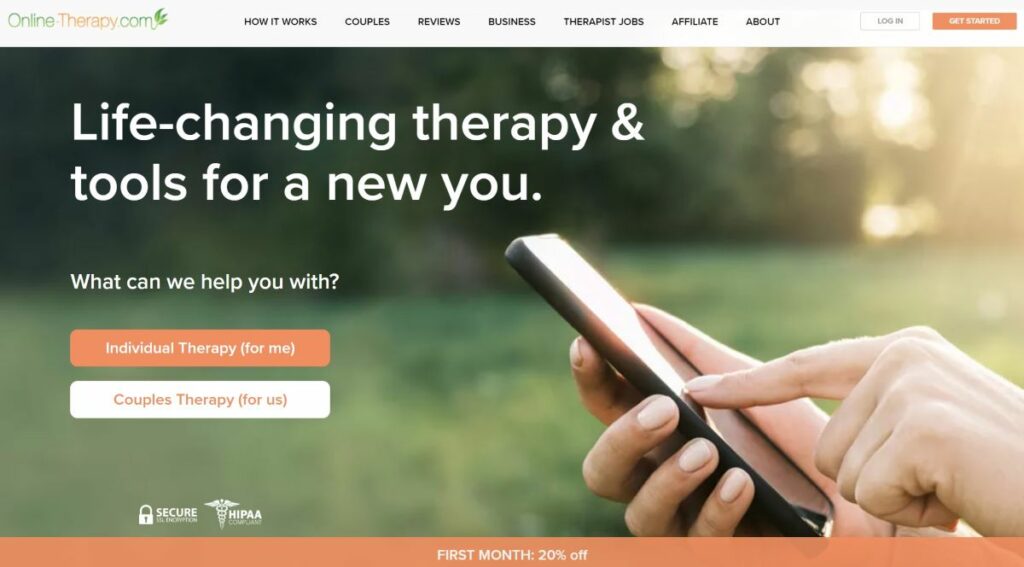
Discover transformative online therapy with Online-therapy.com. Through cognitive behavioral therapy (CBT), Online-therapy.com offers individual and couples support starting at $45/week. Engage in sessions via video, voice, or text for maximum flexibility. Fill out their online questionnaire to get started.
- Good for: Finding licensed and experienced therapists with a Cognitive Behavioral Therapy (CBT) approach.
- Location: Online therapy.
- Pricing: $40/week to $88/week (including our 20% discount first month).
- Features: Unlimited messaging with your therapist, including a daily journal and activity plan, yoga and meditation videos, and tests to see your progress.
Suitable for agoraphobia, online-therapy.com is entirely based on cognitive behavioral therapy (CBT), one of the most effective psychotherapeutic approaches for this disorder. The goal of CBT is to help you recognize, reevaluate and overcome distorted thoughts and unhelpful behavioral patterns.
Read our online-therapy.com review here.
4. Find-a-therapist.com
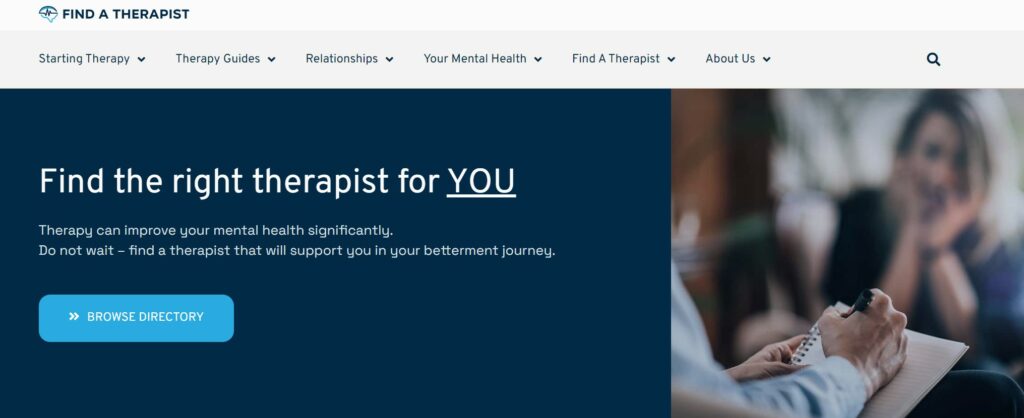
- Good for: Finding and contacting the right therapist for you.
- Location: Online and in-person therapy.
- Pricing: Varies depending on the counselor fee.
- Features: Filter your search, find accessible and effective online and in-person therapy, find guides on different types of therapy.
Find-a-therapist.com offers an online directory where you can find a diverse range of professionals, including anxiety therapists with experience addressing agoraphobia. There, you can customize your search by type of therapy, gender of therapists, languages spoken, and more.
5. Calmerry

Embark on a journey of mental wellness with Calmerry. With diverse subscription options, starting at just $50, Calmerry makes prioritizing your mental health simple and accessible. You can message your therapist any day or schedule a live therapy session from the comfort of your home from any device.
- Good for: Depression therapy, online grief counseling, anxiety therapy, therapy for OCD, self-esteem therapy.
- Location: Online therapy.
- Pricing: $49.50 to $73.75 per week (billed monthly).
- Features: Message to your counselor anytime, text therapy and video therapy according to the plan you choose, free counselor switching.
Calmerry is an online platform that matches you with an agoraphobia therapist after you complete a questionnaire where you can express your needs and preferences for therapy. You can communicate via text message at any time with your therapist.
Read our comparison between Calmerry and BetterHelp here.
6. TalkSpace
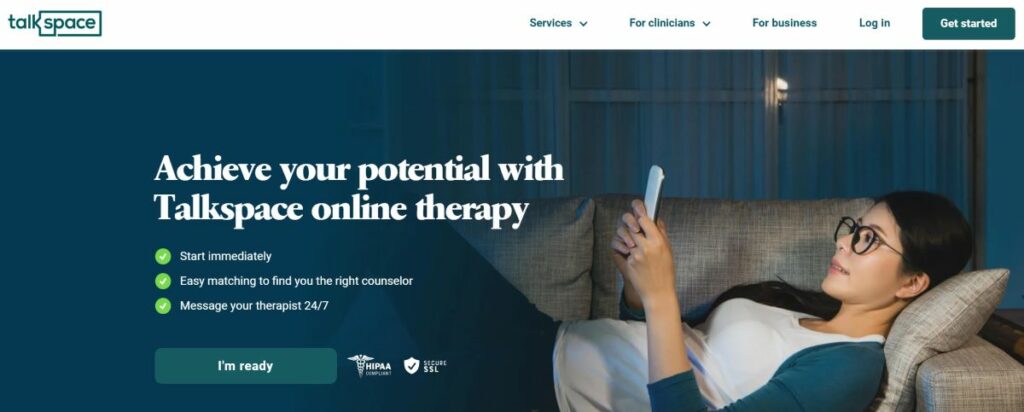
Tailored to individuals, couples, teens, and offering psychiatry services, Talkspace plans kick off at a wallet-friendly $69 per week. What’s more, many health insurances also cover their services, enhancing accessibility and affordability. Complete a questionnaire and get matched with the right therapist for you.
- Good for: Depression, anxiety, bipolar disorder, OCD, PTSD, LGBTQIA+ therapy.
- Location: Online therapy.
- Pricing: Varies according to insurance coverage or self-pay options.
- Features: Accepts insurance, pick your therapist from a list of recommendations, live video sessions and unlimited messaging with your therapist, medication management.
TalkSpace is an online therapy platform that connects you with licensed therapists through a straightforward process. You must express in the initial questionnaire that you are interested in therapy for agoraphobia, this way the platform can help you match with the right therapist for you.
Read our TalkSpace review here.
What is Agoraphobia?
As mentioned at the beginning of the article, agoraphobia is a type of anxiety disorder that causes fear of places from which there seems to be no easy way to escape, especially when going out.
There are a couple of hypotheses that try to explain what leads to agoraphobia.
- The behavioral hypothesis says that agoraphobia is the result of conditioning. In other words, when a person experiences negative or uncomfortable sensations in a certain place, they tend to believe the same thing is going to happen again when they’re in that same place.
- The cognitive hypothesis says that agoraphobia is the result of wrong interpretations of physical sensations, such as rapid heartbeat or sweating.
Agoraphobic people may think these sensations are caused by an upcoming anxiety or panic attack due to being in a crowded place, which in return causes more anxiety.
Symptoms of Agoraphobia

There are three types of symptoms caused by agoraphobia – physical, cognitive and behavioral.
Physical Symptoms
Physical symptoms occur in situations that cause anxiety which are difficult for a person to handle, and therefore lead to avoidance and intense fear of experiencing these situations.
These types of symptoms include:
- Increased heart rate
- Sweating and trembling
- Feeling faint
- Feeling like you’re going to suffocate
- Chest pain
- Nausea
- Dizziness
- Difficulty swallowing
Cognitive Symptoms
Cognitive symptoms are thoughts and feelings related to the physical issues we described above. These symptoms are your thoughts about the physical sensations you’re experiencing.
These symptoms include:
- Intense fear of having panic attacks in public, due to thinking you will be embarrassed
- Fear that the panic attack will be fatal or life-threatening. Patients may even fear they’re going to suffocate or have a heart attack.
- Feelings of being unable to escape from the situation
- Fear of losing sanity
- Fear of losing control.
Behavioral Symptoms
Behavioral symptoms are usually the consequences of other symptoms. Essentially, your patterns of behavior change – you start avoiding places that could cause anxiety, such as crowded places and public transport.
You might avoid being far away from your house and need to be with someone you trust when going outside.
Agoraphobia and Panic Disorder

Agoraphobia and panic disorder often go hand in hand. They have one specific symptom in common and that is anxiety, especially social anxiety.
There are cases in which these two disorders appear separately. People with panic disorder do not necessarily have to suffer from agoraphobia, or vice versa. But since agoraphobia causes extreme anxiety, this could potentially lead to a panic attack, and a person developing panic disorder.
Fortunately, cognitive behavioral treatment is suitable for both disorders.
Even though experiencing these symptoms and living with these disorders can be difficult, there are ways to take back control over your life. Seeking professional help, working through your emotions, and self-reflection are the ways you can begin to overcome agoraphobia symptoms.
Which is the Best Type of Therapy for Agoraphobia?

Cognitive behavioral therapy, also known as CBT, is one of the most effective types of therapy for agoraphobia.
Anxiety is the predominant symptom of agoraphobia, and CBT focuses on teaching you how to better tolerate anxiety by directly challenging your worries and gradually returning you to activities you’ve previously avoided. Cognitive behavioral therapy can teach you which factors trigger a panic attack, as well as techniques that can help you stop them.
CBT is commonly used when treating an anxiety disorder, such as generalized anxiety, obsessive-compulsive disorder, panic disorder, panic attacks, and phobias, including agoraphobia.
The core principles of CBT are based on the idea that psychological problems emerge from unhelpful and distorted ways of thinking, as well as conditioned patterns of unhelpful behavior. CBT relies on the fact that people can learn better ways of coping with their psychological problems, reduce their suffering, and live better, happier lives.
CBT works on changing thinking patterns. This psychological treatment teaches you how to recognize cognitive distortions, reevaluate them, gain a better understanding of your own disorder and your thoughts, and use problem-solving skills to cope with difficult agoraphobic situations.
Patients who go through CBT feel more confident that they can control their own disorder, instead of their disorder controlling them.
CBT also helps you change your behavioral patterns – facing fears instead of avoiding them, and role-playing to prepare for difficult interactions. Sometimes, this type of treatment involves exposure therapy, which involves slowly introducing you to the source of your fear, helping you to eventually overcome this anxiety trigger. Exposure therapy is typically used in the later stages of your treatment program.
CBT may also involve cognitive restructuring techniques, which help to gradually alter negative thoughts and attitudes you may have, especially around social situations and being in open spaces.
Benefits of Online Therapy for Agoraphobia
People with agoraphobia sometimes have a very specific problem. Patients might experience panic and fear while in open spaces or crowded places, or on public transport, possibly leading to a full-on panic attack. Those with severe symptoms might not even be able to leave their own home for fear of panic attacks.
If you’re experiencing these behavioral agoraphobic symptoms, online therapy could be a good place to start. For people who experience extreme anxiety upon leaving their house, merely going to face-to-face therapy can be daunting.
Online therapy reduces exposure to anxiety at the early stages of therapy and allows you to work on your agoraphobia from the comfort of your home, or any other comfortable environment. It might also help you to open up with your therapist, helping to make therapy more effective.
Data shows that online therapy can be just as useful and effective as traditional face-to-face therapy, but it heavily depends on which sort of treatment you prefer. Some people may prefer talking to someone face-to-face, while some find this treatment more anxiety-inducing.
Can Agoraphobia be Cured?
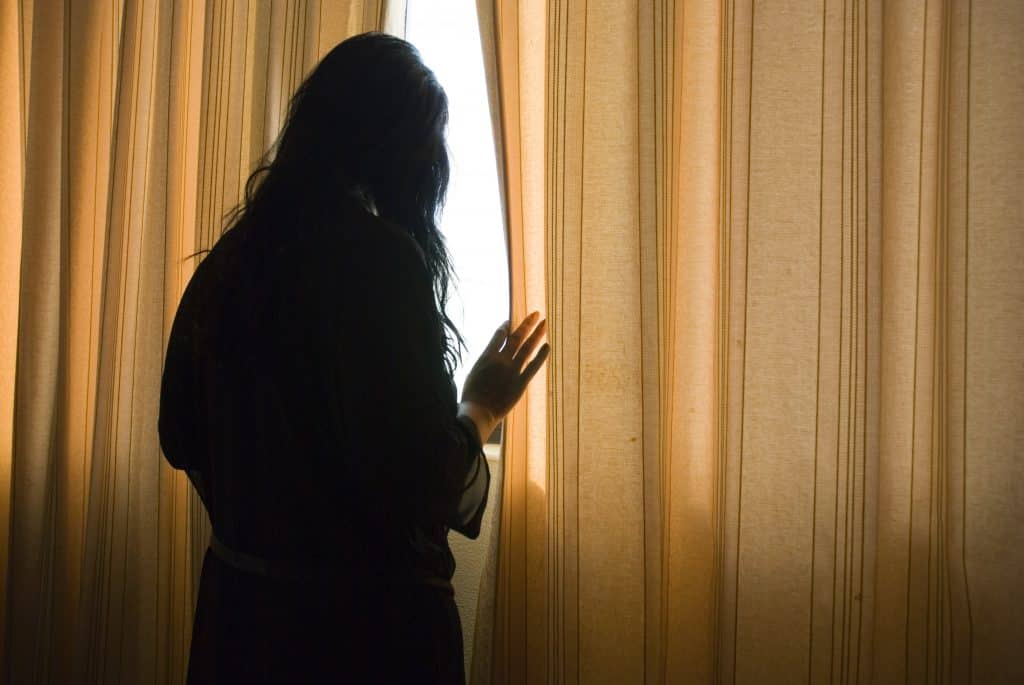
Around a third of people with agoraphobia eventually free themselves of agoraphobic symptoms, with the right professional help. You can treat agoraphobia and eventually free yourself of the disorder.
For others, after going through therapy, you might experience agoraphobia again in the future, when faced with extreme stress. In this case, it may be worthwhile to seek treatment again, for a short period of time, to help you re-learn the techniques you used to avoid having a panic attack.
If you’re still not sure which online therapy platform to choose to treat your agoraphobia, social anxiety disorder, and panic attacks, feel free to contact us and we’ll help you decide between different online counseling and telehealth services.





